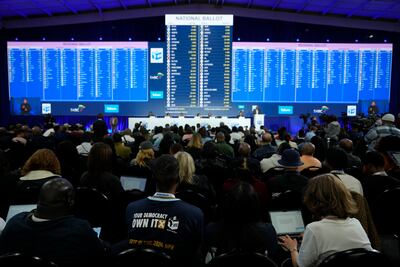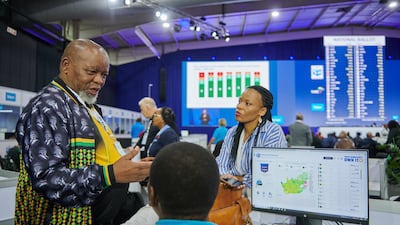South Africa's ruling ANC awaited the imminent confirmation on Saturday that it had lost its three-decade-old absolute majority and would have to find allies to remain in power.
With more than 98 per cent of the votes from Wednesday's election counted, President Cyril Ramaphosa's African National Congress had only 40.15 per cent support, a catastrophic slump from the 57.5 in 2019.
This marks a historic turning point for South Africa as the African National Congress, the party of Nelson Mandela, has enjoyed an absolute majority since 1994, when liberation leader Nelson Mandela led the nation out of white-minority rule and into democracy.
"We have been talking with everybody even before the election," ANC's Deputy Secretary General Nomvula Mokonyane told AFP on Friday, saying the party's decision-making body would set the course to follow after final results are announced.
"Anything must be based on principles and not an act of desperation."
As votes continued to be validated, data from the Independent Electoral Commission (IEC) showed the centre-right Democratic Alliance (DA) held second place with 21.71 per cent, slightly up on its 20.77 showing in 2019.
But it was not a surge by the DA that cut into the ANC's vote share.
In third place was former president Jacob Zuma's uMkhonto weSizwe (MK) on 12.6 per cent, a surprise score for a party founded just months ago as a vehicle for the former ANC chief.

The radical leftist Economic Freedom Fighters (EFF) was in fourth place, with 9.4 per cent.
The final results were to be formally announced on Sunday, but the IEC results website was being updated throughout the day and with the result no longer in doubt, politicians were turning their attention to the prospects of an ANC-led coalition.
The ANC has dominated South Africa's democracy with an unbroken run of five presidents from the party, but if President Cyril Ramaphosa is to remain at the helm he will have to decide whether to seek allies on his right or left.

There will be resistance within his movement to a tie-up with the second-placed DA, under white politician John Steenhuisen, whose free market programme of privatisations and an end to black economic empowerment programmes sits at odds with the ruling party's traditions.
The ANC has won every previous national election by a landslide since the historic 1994 vote that ended white minority rule, but over the past decade its support has dwindled as the economy stagnated, unemployment rose and roads and power stations crumbled.
MK's strong performance, especially in Zuma's home province of KwaZulu-Natal, is one of the main reasons the ANC failed to secure a majority and will now have to strike a coalition deal or another form of agreement with one or more smaller parties.
Political parties' share of the vote determine their seats in the National Assembly, which elects the nation's president. Investors in Africa's most industrialised economy will hope the uncertain picture can quickly become clear.

